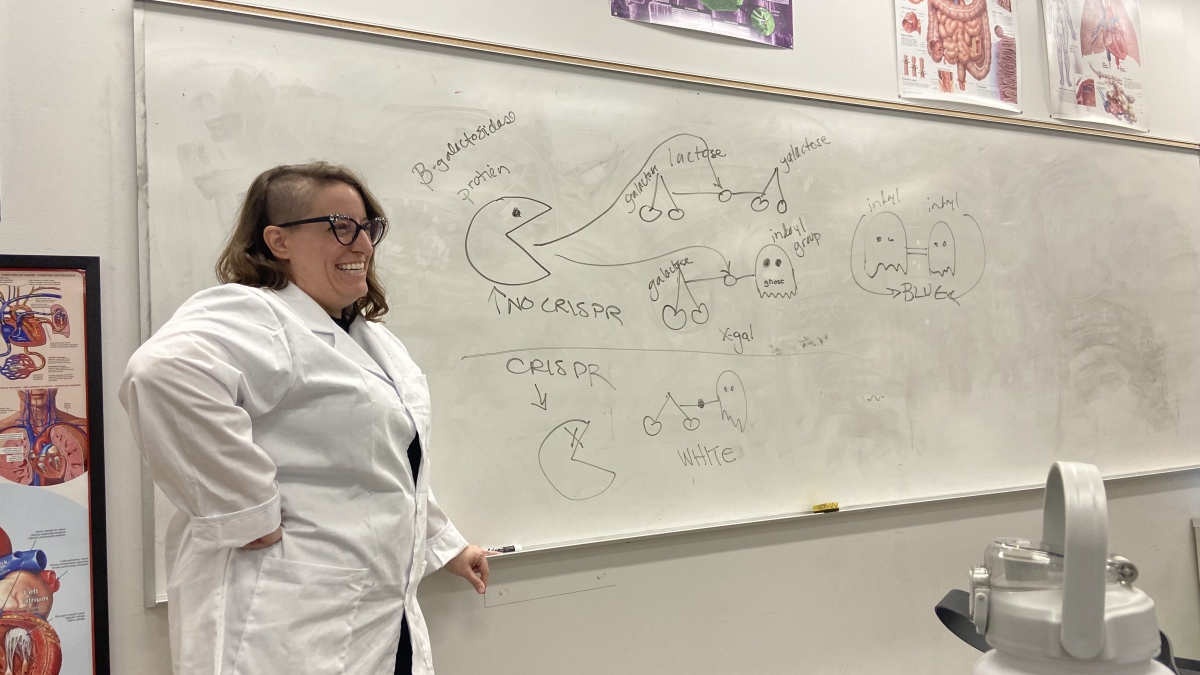NEH Summer Institute leaves impression on humanities scholars from across the US

Erica O'Neil of ASU's Lincoln Center for Applied Ethics facilitates discussion during a lab at the NEH Summer Institute. Photo courtesy the Lincoln Center for Applied Ethics
After an exciting four weeks of intensive study, research and discussion, the 2023 NEH Summer Institute — offered through Arizona State University's Lincoln Center for Applied Ethics and the School of Life Sciences — came to a close with final presentations earlier this month.
The institute, which focuses on providing humanists with the tools and education they need to build capacity to teach and do humanities with impact on emerging developments in bioengineering, was co-directed by Lincoln Center Project Manager of Research Erica O'Neil and Dean's Distinguished Associate Professor in the Life Sciences Jason Robert.
Titled “Our SHARED Future: Science, Humanities, Arts, Research Ethics, and Deliberation,” the program took humanities scholars on a journey of critical engagement over issues of novel technologies through the lenses of ethics, history, philosophy, literature and film.
“Our collective aim was to enhance the competence and confidence of humanists to engage with emerging science and technology. We spent nearly a month learning together and collaboratively with our amazing cohort,” Robert said.
“Scientists are trying to be as ethical as they can, but the burden to discuss ethical and social issues shouldn't rely solely on them when educating the next generation,” O’Neil added. “Having humanities faculty that are more conversant in these issues, I think that’s really important.”
The institute brought together a diverse group of faculty from across the United States, with representation of scholars from Maine, Pennsylvania, New York, North Carolina, Texas and Chicago, alongside faculty from other Arizona institutions.
Professor Lara Kattekola of LaGuardia Community College in New York said, “These are subject matters that humanities faculty may not deal with directly in their research, but these are issues that are all around them. ... Many of them are interested, but just need resources and discussion. At the institute, we had the opportunity to engage in those things around science and technology.”
Participants engaged in activities from readings of "Frankenstein: Annotated for Scientists, Engineers, and Creators of All Kinds" to a hands-on experiment with a bacterial transformation lab using green fluorescent jellyfish protein.
"It was a great experience to actually go to a lab and to practice science as it is,” said Hassan Ajami, a philosophy professor at Chandler Gilbert Community College.
The scholars delivered final presentations on July 7, sharing their plans to integrate teachings from the institute into their work at their home institutions. Many remarked on the unique opportunity the institute and ASU provided for interdisciplinary discussion.
“Beyond the heat, I think the thing that stands out to me about ASU is the ability to try new things,” said Chelsea McKelvey of Clemson University. “(There is a) model of integration that so many other institutions can learn from.”
Walter Keithley of Mesa Community College also participated in the institute. “There are not a lot of places like ASU that have the means, relationships and institutional interest in place to do this,” he said. “But when those elements are in place, a lot of incredible things can happen.”
Robert is hopeful about the impact of the institute going forward. “I think we all have new tools and strategies to try out with our students, and I’m excited for what the future may hold,” he said.
For more information and a full archive of interviews from the institute, visit the Maine Digital Collaborative or the Lincoln Center’s website.
Interviews were conducted by John Muthyala of the Department of English at the University of Southern Maine, a participant of the NEH Summer Institute.
More Science and technology

Applied Materials invests in ASU to advance technology for a brighter future
For nearly 60 years, global giant Applied Materials has been hard at work engineering technology that continues to change how…

Meet ASU engineering students who are improving health care, computing and more
Furthering knowledge of water resource management, increasing the efficiency of manufacturing point-of-care health diagnostic…

Turning up the light: Plants, semiconductors and fuel production
What can plants and semiconductors teach us about fuel production?ASU's Gary Moore hopes to find out.With the aim of learning how…

